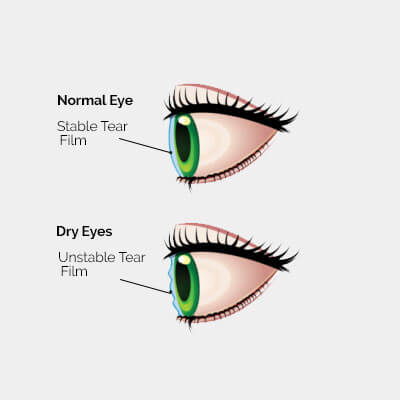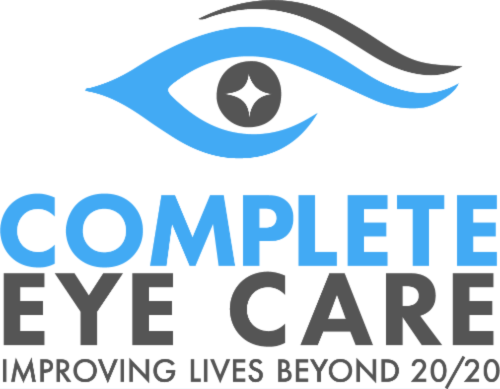Relieve Your Dry Eye at Complete Eye Care
Do you often experience discomfort, irritation, or a burning sensation in your eyes or around your eyelids? you may be suffering from a common condition called dry eye syndrome.
What Is Dry Eye Syndrome?

Dry eye is a condition that occurs when your eyes don’t produce enough tears or when the tears evaporate too quickly. This can result in symptoms such as redness, burning, itching, and sensitivity to light.
What Causes Dry Eyes?
Dry eye is caused by a variety of factors that can affect the quantity or quality of tears produced by the eyes. Here are some common causes of dry eye:
- Age: As we age, our bodies produce fewer tears, making dry eye more common in older adults.
- Environmental factors: Exposure to dry or windy conditions, smoke, or air conditioning can increase tear evaporation and lead to dry eye.
- Digital devices: Spending long hours looking at computer screens, smartphones, and other digital devices can cause eye strain and decrease blinking, leading to dry eye.
- Medications: Certain medications, such as antihistamines, antidepressants, and blood pressure medications, can cause dry eye as a side effect.
- Health conditions: Medical conditions such as diabetes, rheumatoid arthritis, and thyroid disorders can affect tear production and lead to dry eye.
- Hormonal changes: Hormonal changes during menopause can cause dry eye in women.
- Contact lens use: Contact lenses can irritate the eyes and lead to dry eye in some people.

How Do I Know If I Have Dry Eye Syndrome?
There are several signs and symptoms that may indicate that you have dry eye syndrome. Here are some common signs and symptoms to look out for:
- Dryness: Your eyes may feel dry, scratchy, or gritty.
- Redness: Your eyes may be red or bloodshot.
- Irritation: You may experience a burning or stinging sensation in your eyes.
- Watery eyes: Paradoxically, some people with dry eye may also experience excess tearing as the eyes try to compensate for the lack of moisture.
- Sensitivity to light: Your eyes may be more sensitive to light than usual.
- Blurred vision: You may experience intermittent or fluctuating vision, especially when reading or using a computer.
DES can make it difficult for the eye to flush out foreign bodies, so sand, grit, and allergens sometimes get stuck in the eye.
Lasting & Effective Dry Eye Treatment
If you're experiencing symptoms of dry eye syndrome, don't wait to seek help. Book a consultation with one of our eye doctors, who can prescribe a customized treatment plan to keep your eyes healthy and comfortable all day, every day.
Taking care of your eyes is essential for maintaining your vision and overall health. Don't let dry eye symptoms interfere with your daily life

Requently Asked Questions
How do I prevent Dry Eye Symptoms?
- Take frequent breaks when using digital devices: To reduce eye strain and dryness, take breaks every 20 minutes and look away from the screen for at least 20 seconds.
- Blink regularly: Blinking helps to keep your eyes lubricated and moist. Make a conscious effort to blink regularly, especially when using digital devices or reading.
- Adjust your environment: Ensure the air in your home or office isn't too dry. Consider using a humidifier to add moisture to the air.
- Wear sunglasses: Wear sunglasses or other protective eyewear to shield your eyes from wind and sun exposure.
- Maintain a healthy lifestyle: Eat a balanced diet rich in omega-3 fatty acids, stay hydrated, and avoid smoking, which can irritate the eyes and worsen dry eye symptoms.
- Use artificial tears: Over-the-counter artificial tear drops can help to lubricate your eyes and alleviate dry eye symptoms.
Can Dry Eye Syndrome Cause Blindness?
In most cases, dry eye syndrome does not cause blindness. However, if left untreated, severe or chronic dry eye can lead to complications that may affect your vision.
For example, chronic inflammation and damage to the cornea (the clear, outer layer of the eye) can lead to scarring and vision loss. In addition, dry eye can increase the risk of eye infections, which, if left untreated, can cause serious complications, including vision loss.
What is the main cause of dry eye syndrome?
The main cause of dry eye syndrome is an insufficient quantity or poor quality of tears produced by the eyes. Tears are important for maintaining the health of the eyes and providing clear vision. They help to lubricate the eyes, wash away debris, and protect against infections.




